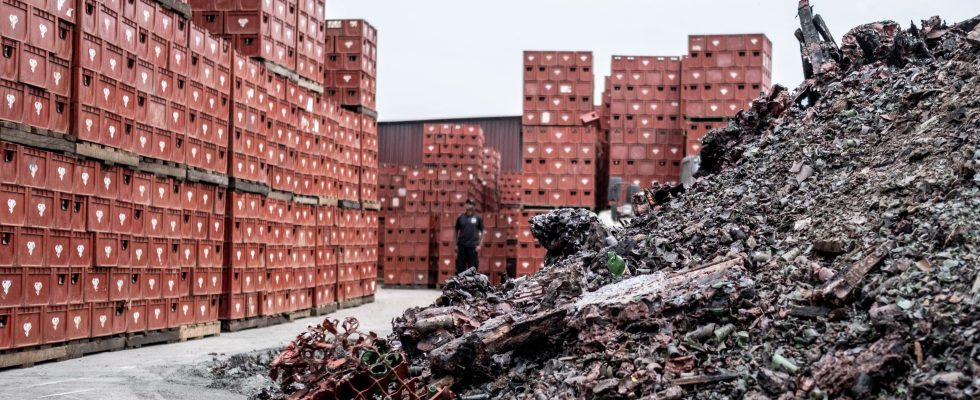Black night. The flames rise in the heights of Bangui, the Central African capital. It is one o’clock when four hooded men, slender and athletic, in military jackets and trousers, leave the area around the Mocaf brasserie, a subsidiary of the French group Castel. Between the concrete walls and barbed wire, thousands of beer containers are on fire. A lightning attack: it lasted less than five minutes. Racks melt and bottles go up in smoke before dawn on Tuesday, March 7.
But who blames the tricolor wine and beer giant for destroying part of its production in the middle of the night? The investigation carried out by the Central African State has so far revealed nothing conclusive. “We use all the documents before making arrests,” explained to AFP, eight days after the fire, the prosecutor of Bangui, Benoît Narcisse Foukpio. However, the identity of the assailants raises few questions in the minds of international experts. The meticulousness of the modus operandi says it all about the experience of the sponsors of the attack.
According to information from RFI Collected from local sources, no fewer than thirty-five incendiary items were thrown into the storage area, with the wasteland serving as a packing depot. On the CCTV images consulted by several media in the days following the fire, the outfits of the four assailants sweep away the meager uncertainties: the mercenaries of Wagner, a Russian paramilitary organization, are behind this attack.
Central African Republic, “pilot field”
This is a new chapter in the war of influence that Russia is waging against France in the Sahel. Deployed on the African continent since 2018, the Wagner group led by its warlord, Evgueni Prigojine, currently very present on the Ukrainian front, continues to want to destabilize the strongholds of the Western presence. And especially French…
The brewer and bottler Castel has dominated the alcohol and sugar market since the end of the 1940s. Its presence is certainly discreet, but extends from Cameroon to Côte d’Ivoire via the Central African Republic. This makes it a pillar of French economic influence on part of the continent. “Three French groups symbolize the French pre-square: Bouygues, Bolloré and Castel”, notes Charles Bouessel, senior analyst at Crisis Group, an international non-profit NGO whose mission is to prevent and help resolve deadly conflicts.
But the domination of the French leaders irritates Moscow. Especially in the Central African Republic. The Russian executive has made one of the world’s poorest countries “a pilot field”, as Charles Bouessel puts it, of its policy of influence. On the soil of the former French colony, where the French army maintained its presence for sixty-two years, the Kremlin’s private militia continues to fuel anti-French sentiment by financing demonstrations and organizing rebellion movements. The objective: drive out France!
Orchestrated demonstrations
In the summer of 2022, a unique opportunity for destabilization is offered to Wagner, who learns in the press that Castel is the target of an investigation carried out by French justice for crimes against humanity in the Central African Republic. The investigation was opened on suspicion of complicity in war crimes after a report by the NGO The Sentry documenting his financial support for Central African rebel groups, deemed terrorists. “This information was taken up and instrumentalized by Russian interests,” notes the analyst.
In the aftermath, the products from the Mocaf de Castel breweries are the subject of a smear campaign in the street and on the Internet. “Castel is death”, “If you buy Castel, you pay for your murder”, can we read on the placards of around twenty demonstrators in front of the brewery in mid-January. Others associate beer with terrorism. “It is clear that these demonstrators were paid by Russian cells, the slogans were also written by the Russians. In exchange for their presence, Central Africans take a nest egg. In a country where famine is glaring, people do not don’t hesitate for long. These are not spontaneous movements”, decrypts Charles Bouessel. The language element of the Kremlin will be taken up within the Central African government itself. In Ngakobo, at the end of January, the Minister of Livestock, Hassan Bouba, affirms in a video that the Castel subsidiaries continue to “supply” the rebels “with ammunition, fuel and food”.
takeover attempt
Once Castel was challenged in the street, Wagner intended to take advantage of it. And why not take control of the Mocaf brewery. Especially since one of the executives of the militia, Dmitri Syty, has launched his own brand of beer, Africa Ti Lor, which he would see prosper. On the night of January 30 to 31, drone overflights were observed, reports RFI. An attempted intrusion by hooded individuals is prevented by site security and the gendarmes. “It must be understood that Wagner is a predatory enterprise. Taking control of the factory has two clear objectives: to extract money and to weaken the West”, underlines the Crisis Group analyst. The head of the militia in the Central African Republic, Vitaly Perfilev, is said to have multiplied the rounds and scouting around the factory.
At the beginning of March, it is finally by the flames that Mocaf is destabilized. Long confined to social networks, the struggle for influence has been more violent for several months. Already in June 2021, an accidental fire had partly ravaged the headquarters of the Orange telephone company, causing the mobile network to be cut off for one in five Central Africans. “These attacks are not always attributable to Wagner. But we have observed a series of fires for two years”, notes Charles Bouessel.
Enough to bring the mayor of Bangui out of his reserve. Émile Gros Raymond Nakombo came to the defense of Castel, one of the main employers in the country: “Between the Central African and this beer, there is more than a love story”. Traditionally discreet, the French group has this time chosen to retaliate with a communication and public display campaign. The “beer war” is not over in the Central African Republic.
